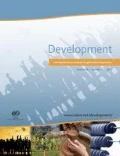Abstract
Brigid Burke and Gregor Wolbring employ favouritism for abilities and ableism lens and the BIAS FREE Framework as two tools to analyse different education initiatives (Education for All, Education for Sustainable Development, Education for Human Rights, Inclusive Education and Adult Education initiatives). They conclude that whereas these initiatives are fragmented, the underlying abilities favoured by the initiatives are complementary and should be combined to increase their potency, which in turn would support the building of a holistic, equitable approach to education to which people are entitled by their human rights.
Similar content being viewed by others
References
Albrecht, G.L. (ed.) (2006) Encyclopedia of Disability, Newbury Park, CA: Sage Publisher.
Burke, Mary Anne and Margrit Eichler (2006) The BIAS FREE Framework: A practical tool for identifying and eliminating social biases in health research, Geneva: Global Forum for Health Research, http://www.biasfree.org/index.html.
Campbell, Fiona A.Kumari (2008) ‘Exploring Internalized Ableism Using Critical Race Theory’, Disability & Society 23 (2): 151–162.
Carlson, Licia (2001) ‘Cognitive Ableism and Disability Studies: Feminist reflections on the history of mental retardation’, Hypatia 16 (4): 124–146.
Gadotti, Moacir (2010) ‘ESD and Education for All: Synergies and potential conflicts’, International Review of Education June, Volume 56, Numbers 2–3, pp 221–234, http://www.springerlink.com/content/y311533130012u22/fulltex.pdf, accessed 21 September 2010.
Glaeser, Edward L., Giacomo Ponzetto and Andrei Shleifer (2007) ‘Why does Democracy Need Education?’ Journal of Economic Growth 12 (2): 77–99.
Global Forum for Health Research (2009) ‘The BIAS FREE Framework: A practical tool for identifying and eliminating social biases in health research’, http://www.globalforumhealth.org/Media-Publications/Publications/The-BIAS-FREE-Framework-A-practical-tool-for-identifying-and-eliminating-social-biases-in-health-research, accessed 5 July 2010.
International Human Rights Funders Group (2008) ‘Resources – Publications’, http://www.hrfunders.org/resources/index.php?op=list&type=2, accessed 5 July 2010.
Mula, Ingrid and Daniella Tilbury (2009) ‘A United Nations Decade of Education for Sustainable Development (2005–14). What Difference Will It Make?’ Journal of Education for Sustainable Development 3 (1): 87–97.
Nolde, O.Frederick (1949) Freedom's Charter: The universal declaration of human rights, New York: Foreign Policy Association.
Overboe, James (2007) ‘Chapter 2: Vitalism: Subjectivity exceeding racism, sexism, and (psychiatric) Ableism’, Wagadu 4: 23–34.
Sheedy, Amanda, Mary Pat Mackinnon, Sonia Pitre and Judy Watling (2008) Handbook on Citizen Engagement: Beyond consultation, Network: Canadian Policy Research.
Taylor, Steven, Bonnie Shoultz and Pamela Walker (2003) Disabilities Studies: Information and resources. Disability Studies Program, Syracuse University, USA, http://thechp.syr.edu/Disability_Studies_2003_current.html, accessed 21 September 2010.
The BIAS FREE Co-Operative (2010) Some Applications of the BIAS FREE Framework [Homepage of The BIAS FREE Co-operative], last update 16 February 2010, http://biasfree.org/applications.html, accessed 15 July 2010.
The United Nations (2010) Millennium Development Goals Report 2010, New York: The United Nations Department of Economic and Social Affairs.
UNESCO (2008) Quality Education, Equity and Sustainable Development: A holistic vision through UNESCO's four world education conferences 2008–2009, Paris: United Nations Educational, Scientific and Cultural Organization.
UNESCO (2009) Policy Guidelines on Inclusion in Education, Paris: United Nations Educational, Scientific and Cultural Organization.
UNESCO 6th International Conference on Adult Education (2009) Belem Framework for Action: Harnessing the power and potential of adult learning and education for a viable future, Belem, Brazil: United Nations Educational, Scientific and Cultural Organization, http://www.unesco.org/en/confinteavi/single-view/news/belem_framework_for_action_available_online_in_six_languages/back/5446/cHash/51289e14ec/.
UNICEF and UNESCO (2007) A Human Rights Based Approach to Education for All, New York; Paris: United Nations Educational, Scientific and Cultural Organization, United Nations Children's Fund.
Wade, Ros and Jenneth Parker (2008) EFA-ESD Dialogue: Educating for a sustainable world, Paris: United Nations Educational, Scientific and Cultural Organization.
Wolbring, Gregor (2008a) ‘Why NBIC? Why Human Performance Enhancement?’ Innovation: The European journal of social science research 21 (2): 25–40.
Wolbring, Gregor (2008b) ‘The Politics of Ableism’, Development 51 (2): 252–258.
Wolbring, Gregor (2010) ‘Human Enhancement Through the Ableism Lens’, Dilemata: International journal of applied ethics 3, accessed 14 July 2010. http://www.dilemata.net/revista/index.php/dilemata/article/view/31, accessed 21 September 2010.
Additional information
Employs a favouritism for abilities and ableism lens to analyze different education initiatives
Rights and permissions
About this article
Cite this article
Burke, B., Wolbring, G. Beyond Education for All: Using ableism studies lens and the BIAS FREE framework. Development 53, 535–539 (2010). https://doi.org/10.1057/dev.2010.72
Published:
Issue Date:
DOI: https://doi.org/10.1057/dev.2010.72




